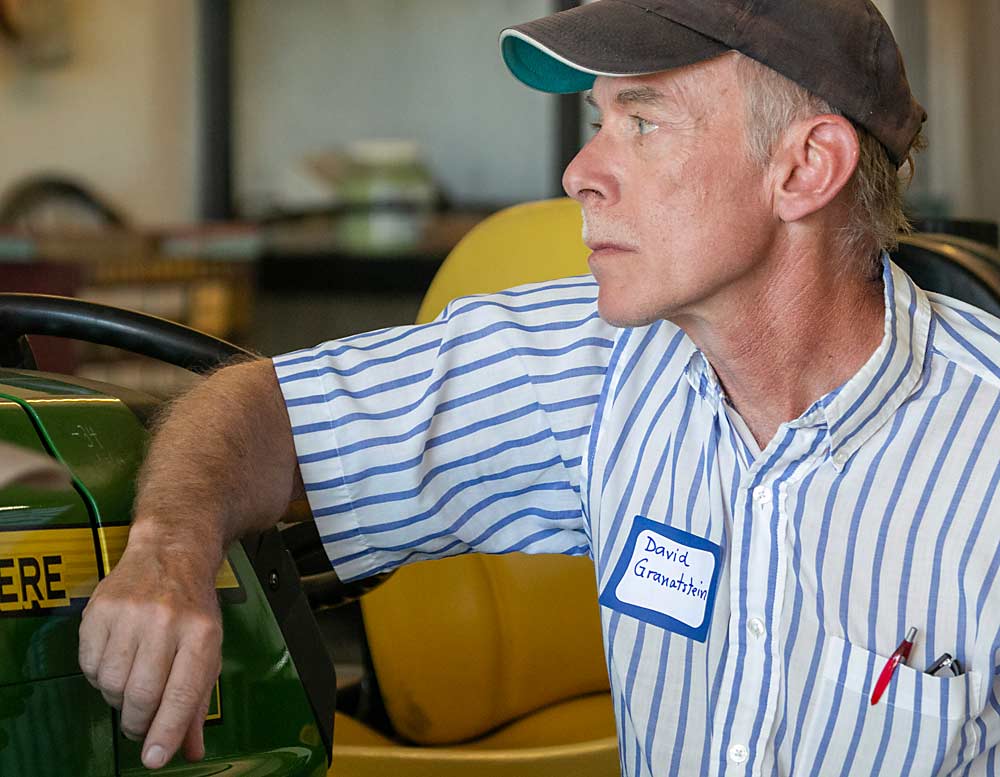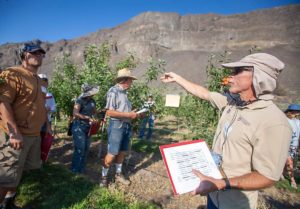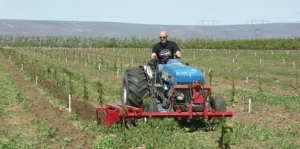
Sustainability is not the answer, it’s the question.
That’s perhaps tough to hear from the man we would expect to have answers about sustainability, given his decades of experience as a sustainable agriculture specialist at Washington State University in Wenatchee. But David Granatstein very intentionally selected that title for his talk to the tree fruit industry.
“A lot of times, people portray ‘sustainable’ as this definable thing, a line you can cross or a box you can check — like organic,” he said. “That’s really misleading. I think hardly anything is totally sustainable. It’s about if something is more or less sustainable.”
Granatstein, now a WSU professor emeritus, will share his vision of sustainability in the Batjer Address at the Washington State Tree Fruit Association Annual Meeting in Kennewick on Dec. 4. The talk will cover some history of the development of sustainable farming practices for Washington orchards and the emerging terminology of the climate-smart agriculture era.
The main point he wants to convey: Sustainability is a journey, not a destination. And growers’ specific practices, on their farms and in their climates, matter a lot more than the label du jour.
“I don’t care if you call it sustainable or regenerative or climate smart,” he said. “A lot of that is marketing hype.”
Instead, he leans into the triple-bottom-line concept, which holds that successful businesses can sustain themselves for the long term with environmentally conscientious practices, social responsibility and business profitability.
Under that framework, sustainability is inherently “fuzzy” when compared, as it often is, to the “black-and-white” organic standard.
To be organic-certified, growers can’t apply certain inputs and must follow specific practices. They can weigh the value of organic certification in the marketplace, along with the cost of production, and decide whether it’s worth pursuing. Washington’s growing climate, with lower disease pressure, enjoys an advantage under such rules, and today about 15 percent of the state’s apple acres are certified organic.
While those certified acres have a big impact on how farmland is managed, and the resulting environmental footprint, Granatstein suspects there is also a “spillover effect” at play, because the organic movement has influenced how growers manage their conventional acreage as well. Think mating disruption, integrated pest management programs to protect natural enemies, and new approaches to soil health.
“I think we are vastly undercounting the effect of what the label has had on the land,” he said.
So, when retailers and customers want to hear about sustainability, the fruit industry already has a lot to say. The challenge is that, the way Granatstein defines sustainability, there is no resting on laurels.
“There’s one version of sustainability — that at one point you just cross a line from unsustainable to sustainable, but that’s nonsense. There is no line,” he said.
Sustainability certifications, in contrast, involve weighing the impacts of hundreds of farming and business practices.
“It’s got to be system- and location-specific,” he said. “Sustainability in New York tree fruit and Washington tree fruit are different. Growers have to make different pesticide choices in different environments because of the climate.”
And it takes a deep understanding of a crop system to rank those practices. For example, is spraying more insecticides in your cherry orchard after harvest sustainable? In the context of little cherry disease pressure, it’s more sustainable than ripping out and replacing an infected block.
“Certifications need to reflect that reality,” Granatstein said.
And while many certification programs strive to do that, sustainability has become a buzzword, drifting around conversations about food production without clear definitions. That’s driven by “businesses looking at the green marketing angle and consumers who don’t understand the complexity of the natural world in which agriculture exists,” he said.
That disconnect, as well as the conundrum of measuring such a complex concept, can be frustrating for growers. But there are also advantages in a concept designed to adapt.
“The world changes. It changes with pests, it changes with water,” he said. “The world is dynamic, so programs and farming have to be, too.”
—by Kate Prengaman








Leave A Comment